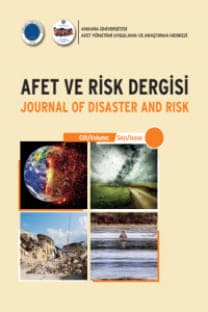İstanbul Elektronik Atık Firmaları Üzerine Bir Örnek Olay İncelemesi: ISO 14000 Çevre Yönetimi
ISO 14000 Çevre Yönetim Sistemi Standartları, E-Atık, Elektronik Atık Firmaları, İş Sağlığı ve Güvenliği, Geri Dönüşüm
A Case Study on Istanbul Electronic Waste Firms: ISO 14000 Environmental Management
ISO 14000 Environmental Management System Standards, E-Waste, Electronic Waste Firms, Occupational Health and Safety, Recycling,
___
- Ahirwar, R., Tripathi, A. K., (2021). E-waste management: A review of recycling process, environmental and occupational health hazards, and potential solutions. Environmental Nanotechnology, Monitoring & Management, 15, 100409. doi.org/10.1016/j.enmm.2020.100409.
- Baxter, J., Lyng, K. A., Askham, C., & Hanssen, O. J. (2016). High-quality collection and disposal of WEEE: Environmental impacts and resultant issues. Waste Management, 57, 17-26. doi: 10.1016/j.wasman.2016.02.005.
- Borthakur, A., (2015). Generation and management of electronic waste in India: an assessment from stakeholders’ perspective. Journal of Developing Societies. 31, 220–248. https://doi.org/10.1177/0169796X14545574.
- Çelik C., (2007). Elektrik Elektronik Atıklardan Metal ve Plastik Geri Kazanımının Araştırılması, Yüksek Lisans Tezi, İstanbul Teknik Üniversitesi Fen Bilimleri Enstitüsü.
- Forti, Vanessa, Bald´e, Cornelis Peter, Ruediger Kuehr, G.B., (2020). The Global E-waste Monitor 2020 Quantities, flows, and the circular economy potential. ISWA.
- Grant, K., Goldizen, F.C., Sly, P.D., Brune, M.-N., Neira, M., Van Den Berg, M., Norman, R. E., (2013). Health consequences of exposure to e-waste: a systematic review. The Lancet Global Health. 1, 350–361. doi: 10.1016/S2214-109X(13)70101-3.
- Hsu, E., Durning, C.J., West, A.C., Park, A.H.A., (2021). Enhanced extraction of copper from electronic waste via induced morphological changes using supercritical CO2. Resour. Conserv. Recycl. 168, 105296. doi.org/10.1016/j.resconrec.2020.105296.
- Kaifie, A., Schettgen, T., Bertram, J., Lohndorf, K., Waldschmidt, S., Felten, M.K., Kraus, T., Fobil, J.N., Kupper, T., (2020). Informal e-waste recycling and plasma levels of non-dioxin-like polychlorinated biphenyls (NDL-PCBs) - a cross-sectional study at Agbogbloshie, Ghana. Science of the Total Environment, 723, 138073–138080. doi: 10.1016/j.scitotenv.2020.138073.
- Kaya, M. (2018), Current WEEE Recycling Solutions, In Waste Electrical and Electronic Equipment Recycling (pp. 33-93), Woodhead Publishing.
- Kemp, S., 2020. Digital use Around the World in July 2020. We Are Soc. Inc, pp. 1–26. Li, X., Wang, L., Wang, Y., Yao, Y., Zhang, P., Zhao, H., Sun, H., (2022). Occupational exposure to organophosphate esters in e-waste dismantling workers: Risk assessment and influencing factors screening. Ecotoxicology and Environmental Safety, 240, 113707. doi: 10.1016/j.ecoenv.2022.113707.
- Liu, R., Ma, S., Yu, Y., Li, G., Yu, Y., An, T., (2020). Field study of PAHs with their derivatives emitted from e-waste dismantling processes and their comprehensive human exposure implications. Environment International, 144, 106059–106069. doi.org/10.1016/j.envint.2020.106059. Montalvo, C., Peck, D., Rietveld, E., (2016). A longer lifetime for products: benefits for consumers and companies. In: POLICY, P.D.A.E.A.S (Ed.), European Parliament’s Committee.
- Rajesh, R., Kanakadhurga, D., Prabaharan, N., (2022). Electronic waste: A critical assessment on the unimaginable growing pollutant, legislations and environmental impacts. Environmental Challenges, 7, 100507. doi.org/10.1016/j.envc.2022.100507.
- Ravindra, P. (2016), Recycling e-waste, International Journal of Innovative Research in Information Security (IJIRIS) Issue 09, Volume 3 (pp.67-71).
- Risco, A., Sucunza, D., Gonzalez-Egido, S., (2021). Chemical recovery of waste electrical and electronic equipment by microwave-assisted pyrolysis: A review. Journal of Analytical and Applied Pyrolysis. 159,105353. https://doi.org/10.1016/j.jaap.2021.105323.
- Yılmaz, E., (2006). Elektrikli ve Elektronik Atıkların Geri Kazanımı ve Muğla İli Pilot Proje Uygulaması, Sakarya Üniversitesi Fen Bilimleri Enstitüsü.
- Ylä-Mella, J., & Román, E. (2019). Waste electrical and electronic equipment management in Europe: learning from best practices in Switzerland, Norway, Sweden and Denmark, In Waste Electrical and Electronic Equipment (WEEE) (pp. 483-519), Woodhead Publishing.
- URL1 V. Forti, C.P. Bald´e, R. Kuehr, G. Bel, The Global E-Waste Monitor 2020, Bonn/ Geneva/Rotterdam, 2020. http://ewastemonitor.info (Last Acceded: 10.01.2018).
- URL2 U.S. Bureau of Labor Statistics, Consumer Price Index, Consum. Price Index Databases, 2020 https://www.bls.gov/cpi/data.htm (Last Acceded: 18.12.2017).
- URL3 European Parliament, Directive 2012/19/EU of the European Parliament and of the Council of 4 July 2012 on waste electrical and electronic equipment (WEEE), J. Eur. Union (2012). https://eur-lex.europa.eu/legal-content/EN/LSU/?uri=celex:32012L0019 (Last Acceded: 22.02.2018).
- Yayın Aralığı: Yılda 4 Sayı
- Başlangıç: 2018
- Yayıncı: Ankara Üniversitesi
Türkiye’de Yapılan Kuraklık Analiz Çalışmaları Üzerine Bir Derleme
Yasemin DENİZ ÖZTÜRK, Ramazan ÜNLÜ
Ahmet GÖKCAN, Fahri OLUK, Göksel DEMİR
Elif Beyza AYAS, Nilsu ÖZTÜRK, Süleyman İNAN, Gözde SAYIN KARAKAŞ
İş Becerikliliğinin Akış Deneyimi Üzerindeki Etkisi: AFAD Karadeniz Bölgesi Örneği
Güvenlik ve Acil Durum Koordinasyon Merkezi (GAMER) ve Yapay Zekânın Afetlerde Uygulanabilirliği
İstanbul Elektronik Atık Firmaları Üzerine Bir Örnek Olay İncelemesi: ISO 14000 Çevre Yönetimi
Busra SAGLIK, Tuğçe YILMAZ KARAN, İnci KARAKAŞ, Rüştü UÇAN, Nuri BİNGÖL, Mesut KARAHAN
Karmaşık Bir Sosyo-Ekolojik Afet Olarak Göç ve Göç Araştırmalarında CBS
Çağla Melisa KAYA, Besime YÜCEL
AFAD Çalışanlarının İşe İlişkin Duyuşsal İyilik Algısı
